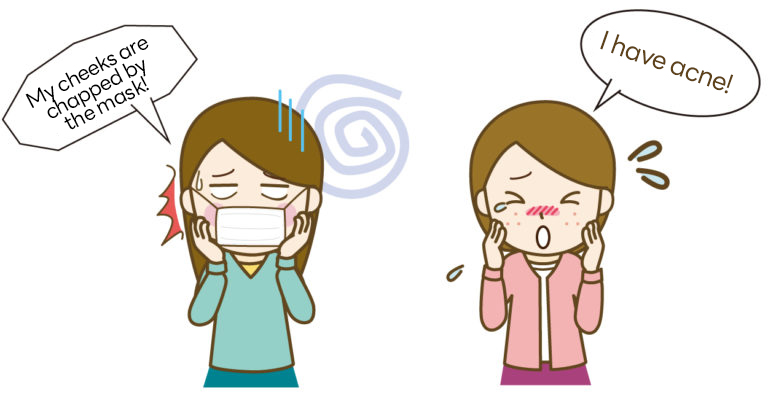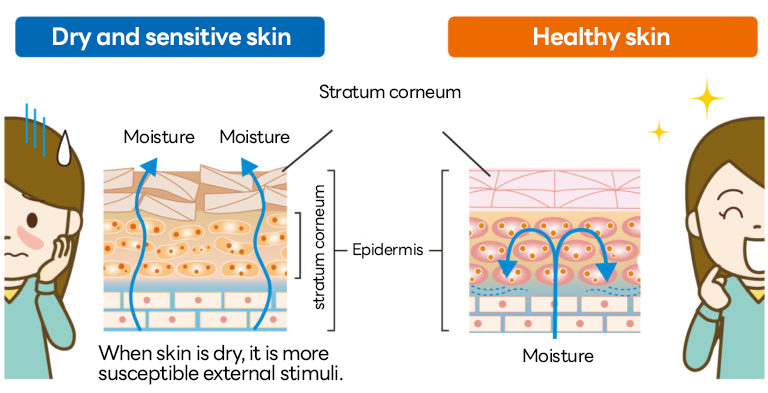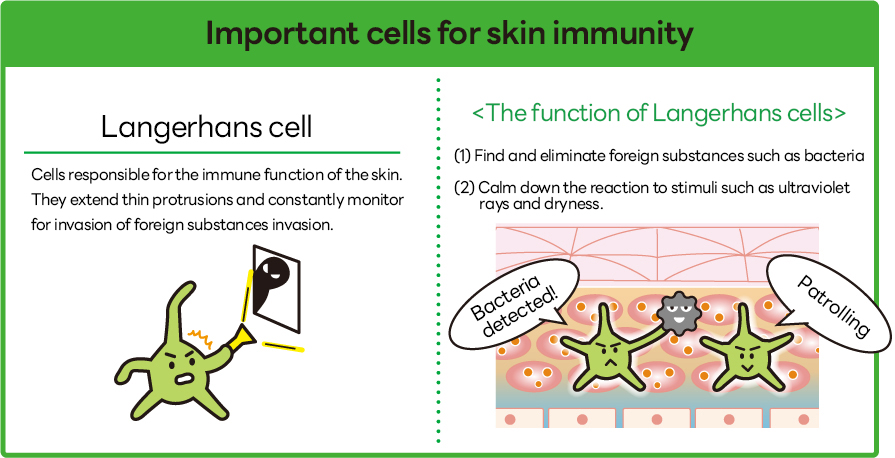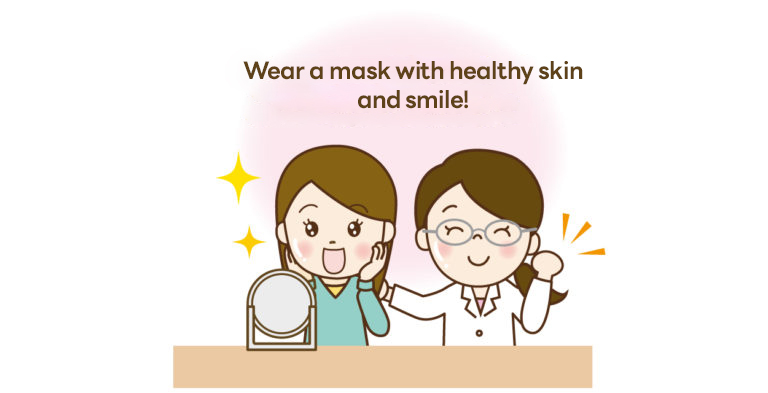Focus on your skin’s immunity to prevent skin problems!
Masks dry out your skin!?

Nowadays, we cannot do without masks every day. Did you know that the number of skin problems caused by masks is increasing rapidly? Even people whose skin is not sensitive to masks are experiencing an increase in skin problems because they wear masks 24/7 when they go out or meet with others. Since your skin will be more sensitive to the dryness of the coming season, here are some measures you can take to avoid skin problems.
Why does it cause skin irritation?

Since people started wearing masks, more and more people are suffering from skin problems such as pimples and rough skin around the chin that they never had before. Let’s take a look at why skin problems are increasing.
1. Skin friction caused by masks
Friction caused by putting on and taking off the mask, talking, or slipping off the mask for some reason irritates the skin, leading to a decrease in the skin’s barrier function*. Skin with a lowered barrier function is prone to bacterial growth, which can lead to acne and inflammation, which can lead to eczema.
Skin barrier function: A function of the skin that prevents foreign substances from outside the body and moisture evaporation from inside the body.
2. Dryness when mask is removed
While wearing the mask, you may feel that your skin is somehow kept moist because the inside of the mask is moistened by your breath, but in fact, the moment you take off the mask, the moisture evaporates at once and the skin becomes dry. What is even more important to note is what happens after the mask is removed. Just as skin tends to dry out after taking a bath, some people may have experienced skin tightness or burning.
Dry skin also leads to a decrease in the barrier function. A decrease in the barrier function can lead to more skin damage.
3. Allergy caused by mask material or dust adhering to the mask
Masks are in close contact with the skin for long periods of time, which can cause symptoms of “contact dermatitis. In particular, allergic contact dermatitis can be caused by a variety of factors, including the material of the mask and dust or pollen that remains attached to the mask. Note that people with sensitive or allergic skin are more likely to develop this condition.
The skin also has an immune system!

Just as you are more likely to catch a cold when your body’s immune system is weakened, your skin is more likely to develop skin problems when your skin’s immune system is weakened. When the barrier function of your skin is reduced and problems increase, the number of Langerhans cells decreases and they are stretched thin, which leads to more inflammation and, as a result, the risk of skin and systemic illnesses.
Decreased barrier function is a risk!
When the skin’s barrier function declines and more problems occur, the number of Langerhans cells decreases and they are stretched thin, leading to even greater inflammation, which in turn leads to the risk of skin and systemic diseases.

Five measures to improve the barrier function!

Measures from the outside
(1) Take UV care
General masks allow ultraviolet rays to pass through. If you do not apply sunscreen because you are wearing a mask, UV rays can destroy cells in seconds. Also, in some cases, petroleum-based surfactants produce harmful active oxygen when exposed to UV rays, so use sunscreen cream that is gentle to the skin.
2) Wash your face gently.
Use lukewarm water and lather your face thoroughly with a low-irritant face wash to prevent the loss of necessary moisturizing ingredients.
(3) Moisturize well
When the amount of moisture in the stratum corneum, the surface layer of the epidermis, decreases, the skin becomes dry and the barrier function declines. Make sure to keep your skin adequately moisturized.
Measures from the inside
(4) Avoid stress.
Reactive oxygen species (ROS) play a role in the body to fight off bacteria and viruses, but stress increases ROS and attacks normal cells and genes. Relax and get a good night’s sleep.
5) Eat a well-balanced diet
Like your body, your skin is made up of the food you eat. For healthy skin, take care of it from the inside as well.
Colorful vegetables with antioxidant properties
Komatsuna, carrots, etc.
Vitamins necessary for collagen production
Strawberries, citrus fruits, etc.
Proteins that enhance moisture retention
Fish, soybeans, etc.
Dietary fiber that regulates the intestinal environment
Konjac, seaweed, beta-glucan, etc.


